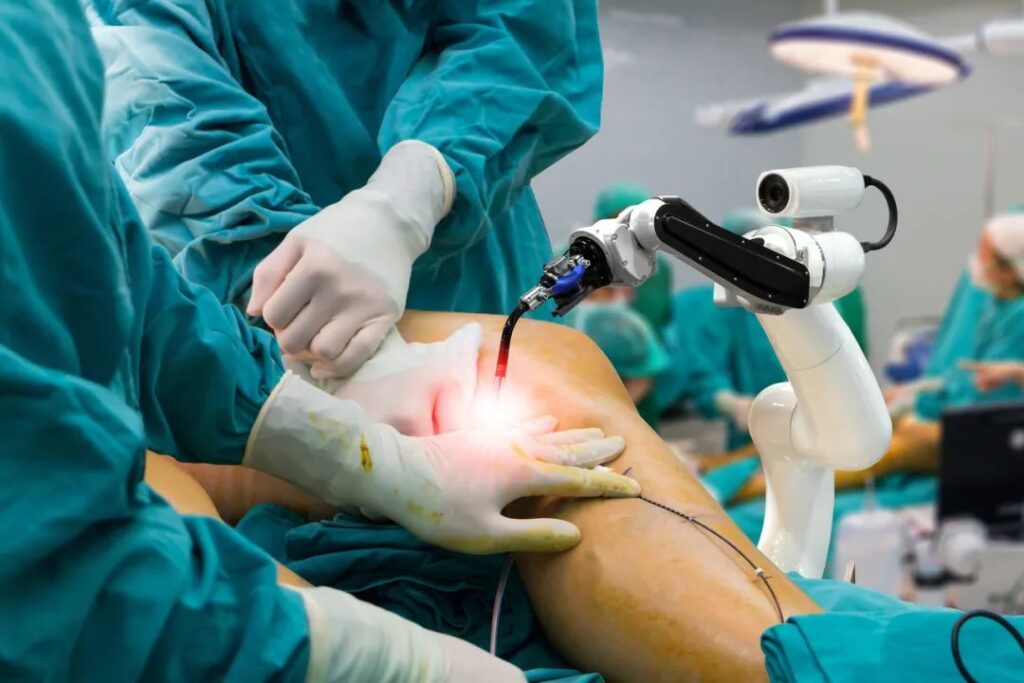
In the realm of contemporary medicine, advancements in technology have continually expanded the frontiers of accuracy, security, and efficacy. One of these pioneering developments is robotic-assisted knee replacement surgery — a technique that is revolutionizing how orthopedic surgeons such as Dr. Animesh Kumar assist patients in restoring pain-free motion and an improved level of living.
If you or a loved one is experiencing ongoing knee pain and being referred for surgery, learning about robotic knee replacement may alter how you perceive joint surgery.
What Is Robotic Knee Replacement?
Robotic Knee Replacement is a minimally invasive operation where the orthopedic surgeon operates a robotic system to guide the replacement of a broken or deteriorated knee joint with a prosthetic implant.
It’s worth noting: the robot doesn’t actually do the surgery. Rather, the robotic arm serves as an extension of the surgeon’s hand, giving precise and unmatched control during the procedure.
Robotics such as MAKO (Stryker), ROSA (Zimmer Biomet), and NAVIO (Smith+Nephew) take real-time information and 3D visualization to assist the surgeon in the surgery with more precision than even possible in traditional techniques.
How the Procedure Works
The robot-assisted procedure usually entails:
1. Preoperative Planning
With 3D imaging or CT scans, a personalized surgical plan is made. The system plans the patient’s individual bone shape and determines the best alignment and size of the implant.
2. Intraoperative Assistance
In surgery, the robotic arm gives the surgeon real-time navigation and feedback. It allows the surgeon to remove only as much bone is required and implant it with sub-millimeter precision.
3. Monitoring Post-Surgery
Even digital records and real-time monitoring of outcomes following the procedure are made possible in some systems, enabling even greater long-term care.
Benefits of Robotic Knee Replacement
Robotic knee replacement has numerous confirmed advantages over traditional knee replacement:
1. Greater Precision
Conventional knee replacements are highly dependent on the surgeon’s visual perception. Robotic platforms provide precise bone cuts and implant placement, which enhances overall function and longevity.
2. Reduced Recovery Time
With greater precision of alignment and lower trauma to surrounding tissues, patients tend to have less postoperative pain, less swelling, and more rapid return to mobility.
3. Enhanced Implant Longevity
Improved alignment of the knee joint decreases wear and tear on the prosthesis, perhaps making the implant last for 20 years or longer.
4. Reduced Risk of Complications
The controlled environment provided by robotic systems results in fewer complications during surgery, reduced blood loss, and fewer opportunities for revision surgery.
5. Improved Patient Outcomes
Clinical studies have shown that patients who undergo robotic-assisted surgery often report greater satisfaction, improved function, and faster rehabilitation compared to traditional techniques.
Why Choose Dr. Animesh Kumar?
Dr. Animesh Kumar, a seasoned orthopedic and joint replacement surgeon in Pune, is a big believer in embracing robotic technology to improve patient care. Having undergone comprehensive training and hands-on experience with robotic systems, he has been able to deliver knee replacements with greater accuracy and improved results.
By integrating clinical proficiency with advanced technologies, Dr. Animesh provides patients with:
Tailored surgical planning
Less post-operative pain
Quicker recovery periods
Improved joint function and longevity in the long run
Who Might Qualify for Robotic Knee Replacement?
You might be an appropriate candidate if:
Suffer from advanced osteoarthritis or joint deterioration
Experience persistent knee pain, stiffness, or loss of mobility
Have not derived benefit from conservative measures such as medication or physiotherapy
Are seeking a long-term solution enhancing joint alignment and mobility
Nonetheless, robotic knee replacement might not be the best fit for individuals with active infection, suboptimal bone quality, or some neurological disorders. Preoperative evaluation by your surgeon is important.
Conclusion
Robotic knee replacement is the future of orthopedic surgery. By combining intelligent technology with surgical skill, it is a safer, more precise, and more efficient option for traditional joint replacement.
Dr. Animesh Kumar is a highly experienced Orthopedic and Joint Replacement Surgeon based in Mumbai, specializing in Robotic Knee Replacement, Total Knee Replacement, Hip Replacement, and Sports Injury Management. Known for his patient-centered approach and commitment to innovation, Dr. Kumar combines advanced surgical techniques with compassionate care to help patients reclaim pain-free movement and a better quality of life.




